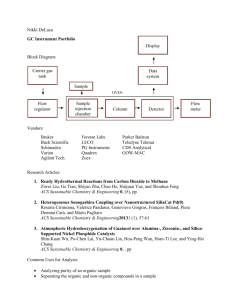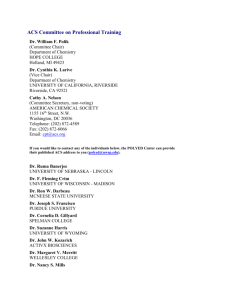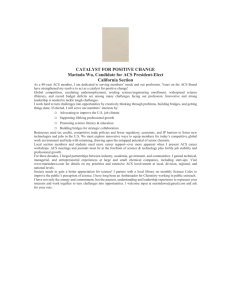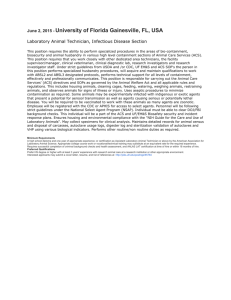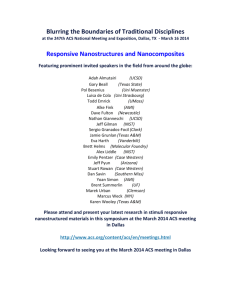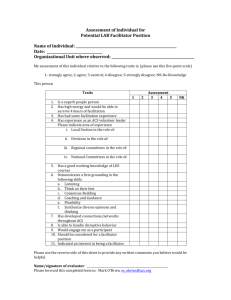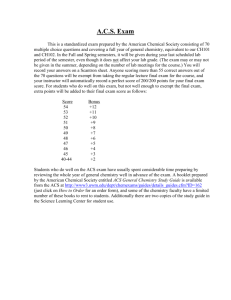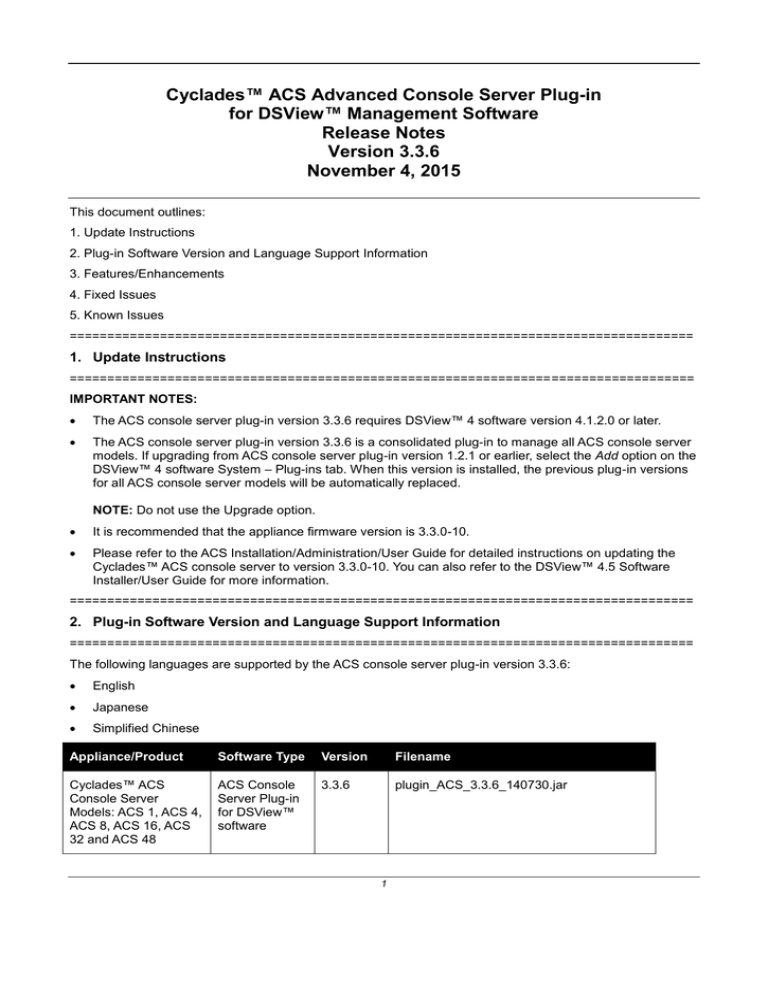
Cyclades™ ACS Advanced Console Server Plug-in
for DSView™ Management Software
Release Notes
Version 3.3.6
November 4, 2015
This document outlines:
1. Update Instructions
2. Plug-in Software Version and Language Support Information
3. Features/Enhancements
4. Fixed Issues
5. Known Issues
===================================================================================
1. Update Instructions
===================================================================================
IMPORTANT NOTES:
The ACS console server plug-in version 3.3.6 requires DSView™ 4 software version 4.1.2.0 or later.
The ACS console server plug-in version 3.3.6 is a consolidated plug-in to manage all ACS console server
models. If upgrading from ACS console server plug-in version 1.2.1 or earlier, select the Add option on the
DSView™ 4 software System – Plug-ins tab. When this version is installed, the previous plug-in versions
for all ACS console server models will be automatically replaced.
NOTE: Do not use the Upgrade option.
It is recommended that the appliance firmware version is 3.3.0-10.
Please refer to the ACS Installation/Administration/User Guide for detailed instructions on updating the
Cyclades™ ACS console server to version 3.3.0-10. You can also refer to the DSView™ 4.5 Software
Installer/User Guide for more information.
===================================================================================
2. Plug-in Software Version and Language Support Information
===================================================================================
The following languages are supported by the ACS console server plug-in version 3.3.6:
English
Japanese
Simplified Chinese
Appliance/Product
Software Type
Version
Filename
Cyclades™ ACS
Console Server
Models: ACS 1, ACS 4,
ACS 8, ACS 16, ACS
32 and ACS 48
ACS Console
Server Plug-in
for DSView™
software
3.3.6
plugin_ACS_3.3.6_140730.jar
1
===================================================================================
3. Features/Enhancements
===================================================================================
PDU Polling Rate: Enhancement in the polling rate configuration, which requires firmware version 3.3.0-9 or
later. The Polling Rate configuration is done by serial port during the Add Power Management Device wizard.
The Administrator can update the value on the General page after drilling in to the serial port information in the
Ports-Serial table. The unit of the PDU polling rate will be in seconds.
===================================================================================
4. Fixed Issues
===================================================================================
The PDU settings (under Appliance Settings) work without issue when the appliance is running version 3.3.0-9 or later.
===================================================================================
5. Known Issues
============================================================================================
The following issues are still present in this release:
The Sequence Interval and Reboot Delay parameters (available for ServerTech power devices) are global
parameters applied to both units in a chain. Although those parameters are shown in the first and second
units of the chain, the configuration entered for the first unit is valid for the whole chain, while the
configuration entered for the second unit is ignored.
The ACS console server plug-in only accepts the Link_local IPV6 address for the Default Gateway when
adding an ACS console server to DSView™ 4 software and assigning it a static IPV6 address. This
happens when the ACS console server is still not configured with an IP address and it is being added to
DSView™ 4 software. The Default Gateway address can be changed later on the Appliance Settings
-Network page if necessary.
If the ACS console server is configured to Dual Stack (IPV4 and IPV6), IPV4 SNMP Managers must be
configured using the IPV4 mapped IPV6 format. The IPV4 mapped IPV6 format consists in using
“::FFFF:<followed by the IPV4 address>”. As an example, the IPV4 address 192.168.10.10 would be
mapped IPV6 as “::ffff:192.168.10.10”.
If an ACS console server is added to DSView™ 4 software using the IPV4 (or IPV6) address type, the
DSView™ 4 software will use this address for all later communication attempts with that ACS console
server. If the ACS console server address type is later changed and that previous IP address is no longer
valid, the appliance must be removed from DSView™ 4 software and added again. Otherwise the IP
address type will not be changed.
When the ACS console server firmware version is upgraded from a version not supporting IPV6 (1.0.2 or
earlier) to a version that does support it (3.3.0-5 or later), the IPV6 configuration will still be unavailable
through DSView™ 4 software until its topology data base is synchronized. This synchronization occurs
automatically through the periodic update topology operation or it can be forced by executing a “Resync”
operation in the DSView™ 4 software.
Spaces and tilde (‘~’) characters cannot be used in Target names. If those characters are used, pushName
operations for the ACS console server will not work.
PushNames of PDU names are not supported.
Unique SSH keys are generated in the ACS console server as soon as it boots for the first time (from
factory default configuration). This operation happens only once, and it takes about five minutes to
complete. Only after that is it possible to add the ACS console server to DSView™ 4 software.
2
When adding the ACS console server to the DSView™ 4 software through the Add Appliance Wizard, the
main interface (eth0) IP address must be selected. If any other IP address is used, even if it is valid, Data
Logging and Syslog event notification will not work.
For ACS console server serial port direct access through the DSView™ 4 software built-in serial viewer to
work properly, the serial ports must be configured for SSH use.
It is not recommended that the user change the configuration performed by the ACS console server plug-in
in the ACS console server by directly editing its configuration files. Even if the configuration steps
described in the appliance documentation are correctly followed, the ACS console server plug-in may no
longer recognize the saved configuration. In some cases, not even the ACS console server Web or CLI
interfaces are recommended for configuration if the ACS console server is being managed by DSView™4
software.
For target devices that are associated (merged) to one or more outlets, the Status Auto-refresh option in
the user profile configuration page should be set to a value greater than the default 30 seconds (5 minutes
is recommended).
Existing known issues with dial-up to the ACS console server:
o
One time password (OTP) is not supported when using ISDN for dial-up.
o
If callback is enabled for ISDN cards, the plug-in will show the IP addresses in the Appliance
Settings- Dial-up- Settings page as 0.0.0.0. However, this does not mean that the correct IP
addresses are not used and assigned.
o
If the user needs to launch a serial session while a dial-up connection is established between the
DSView™ 4 server and that appliance (this usually means a connection from the user workstation
to the appliance), it will be necessary to enable the DSView™ 4 software proxy tool on the System
- DSView Server - Proxy Server page.
o
The IP address used for dial-up configuration cannot be the same as the primary network IP
address.
o
On the Dial-Up - Settings page, the following radio buttons or checkboxes do not have their state
saved since they are used only to define actions to be taken when the Save button is selected:
Change password, Set PPP IP addresses, Choose addresses Automatically/Manually, Reset
Sequence Now, OTP Passphrase, Random Passphrase and Change Passphrase.
o
The DSView™4 software drops the dial-up connection by PPP idle timeout (default: 2 minutes).
The dial-up connection will not be dropped if the user keeps accessing the appliance or the serial
ports via DSView™ 4 software.
o
For DSView™ 3 software versions earlier than 3.7.2.88, the callback options for dial-up
connections may not work with the DSView™ 3 software in Linux if the modem cable does not
have the CD signal. If the chat application is hanging (waiting for the CD signal), add a line setting
the clocal of the serial port (“stty –F /dev/$TTY clocal”) before opening the modem port with
“$CHAT_CONNECT” in the linux_check_ppp.sh script (this will indicate that the CD signal should
be ignored).
stty -F /dev/$TTY clocal
$CHAT_CONNECT </dev/$TTY>/dev/$TTY
Run the Add Power Manager wizard with ports that have a PDU attached. Otherwise, if the CTS, CD or
DSR are not active on the selected port, the wizard will take more than 100 seconds before displaying an
error message.
Per segment alarm current threshold support for 2-segment Cyclades™ Intelligent Power Distribution Units
(IPDUs) is not available for IPDUs with firmware version 1.8.0 or earlier.
Detection of a 2-segment Cyclades™ IPDU is failing when there is one Avocent® Power Management
Power Distribution Unit (PM PDU) with version 1.3.0 in the chain before the 2-segment Cyclades™ IPDU.
3
This problem affects the Power Device Add operation through DSView™ 4 software, because the chain will
not be detected.
If an ACS console server with ServerTech Smart CDU is added to more than one DSView™ 4 software
appliance and the Resync is run instead of the Add Power Device wizard, it is possible that the Smart CDU
appears with Type “69” instead “ServerTech Power Device” in the Unit Views of the DSView™ 4 software.
In this case, run the Remove Power Devices wizard in the DSView™ 4 software that shows Type “69” and
run the Add Power Devices wizard to fix the Type.
Emerson, Emerson Network Power and the Emerson Network Power logo are trademarks or service marks of Emerson Electric Co.
Avocent, Cyclades and DSView are trademarks or service marks of Avocent Corporation. All other marks are the intellectual property of
their respective owners. This document may contain confidential and/or proprietary information of Avocent Corporation, and its receipt or
possession does not convey any right to reproduce, disclose its contents, or to manufacture or sell anything that it may describe.
Reproduction, disclosure, or use without specific authorization from Avocent Corporation is strictly prohibited. ©2015 Avocent Corporation.
All rights reserved.
4

